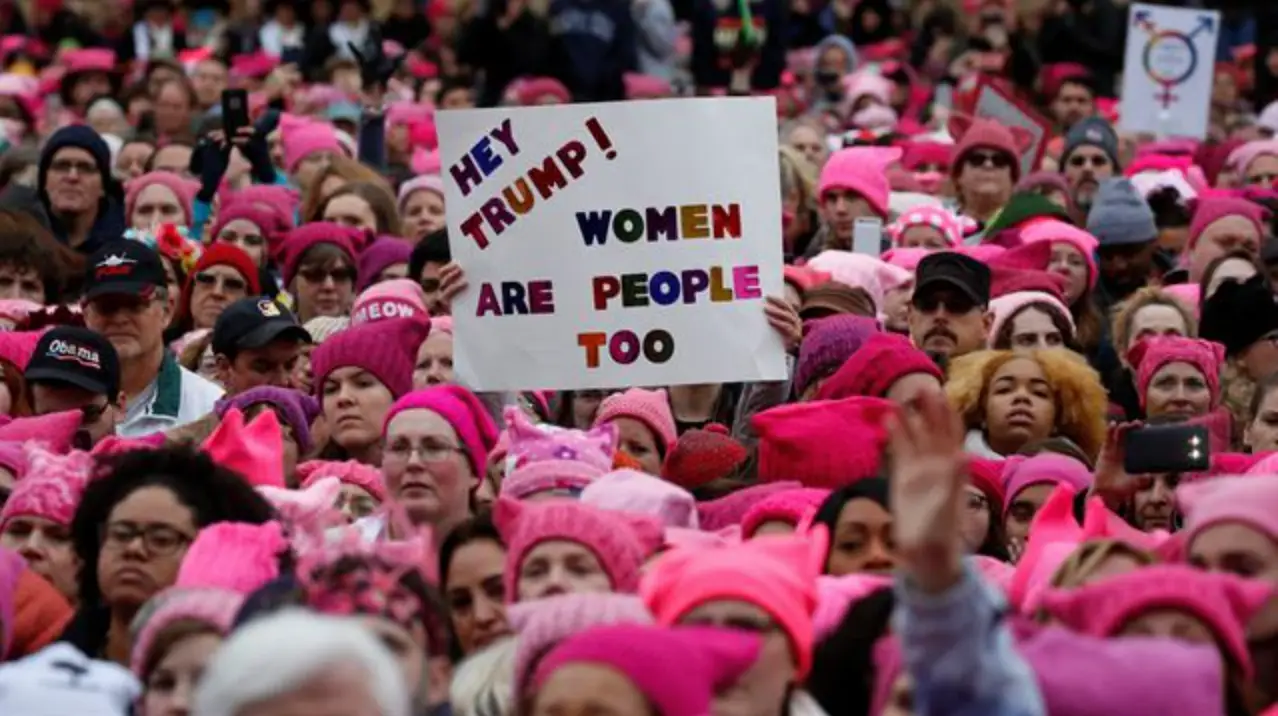The recent election of Donald Trump as President of the United States has generated concern in the feminist movement, anticipating possible setbacks in women’s rights in the United States. There are many reasons to fear.
During his first term (2017-2021) Trump promoted actions that were perceived as detrimental to the advancement of gender equality. Among some of the most representative policies of his anti-feminist cut during his first term he reactivated the Global Gag Rule, which prohibits international organizations that receive U.S. funding from performing, promoting, or reporting on abortions as a sexual and reproductive right. This significantly affected access to women’s health services in developing countries.
He also appointed conservative judges, such as Brett Kavanaugh and Amy Coney Barrett, consolidating an ideological majority that subsequently allowed the overturning of Roe v. Wade (constitutional protection for pregnant women to choose to have an abortion without excessive government restrictions). Although this occurred in 2022 after his term, the groundwork was laid during his administration.
During his tenure, there were budget cuts and changes in priorities affecting programs to protect and support victims of gender-based violence and sexual assault. The Trump administration also halted an Obama-era rule that required large companies to collect wage data disaggregated by gender and race, hindering efforts to address the wage gap.
In addition, regulations protecting female employees at federal companies from sexual harassment and discrimination were eliminated. Despite initial promises in his campaign, the administration did not advance paid parental leave laws.
During his tenure, Trump made multiple misogynistic and derogatory comments toward women, both publicly and privately. This contributed to hostility towards the feminist and women’s rights movements. There were Cuts to Medicaid and Planned Parenthood access that made it difficult for low-income women to access essential health services, including medical checkups, contraception, and pregnancy-related services.
And finally, “zero tolerance” immigration policies separated migrant families, primarily affecting mothers and children fleeing violence in their home countries.
Trump’s first term, in general, was marked by divisive rhetoric and policies that intensified racial, gender, and class tensions. His re-election, despite being convicted of sexual abuse and other criminal behavior against women, represents an endorsement from his more conservative support base, which sees in him a leader capable of countering progressive advances in women’s rights and social justice.
This endorsement evidences a growing fracture in U.S. society where large sectors perceive feminist gains as a threat to traditional values. In fact, right-wing influencers, or the “manosphere” as it is known, took advantage of Donald Trump’s presidential victory in November 2024 to increase misogynistic threats on the internet: “Go back to the kitchen!”, “Repeal the 19th” (in reference to the constitutional amendment that gave women the right to vote), “Your body, my choice” and other slogans against feminist struggles that went viral in a very short time.
The symbolism of his comeback in the Region.
The reelection of Donald Trump, after an interlude of Democratic rule, marks a critical point not only for U.S. politics but also for the global panorama of human rights and struggles for equality throughout Latin America.
This return to power represents the strengthening of conservative and populist forces in a context of increasing political polarization and reflects a clear resistance to progressive social change as many of his policies are aimed at reversing recent advances in reproductive and labor rights.
Moreover, his victory reinforces conservative leaders and movements around the world, especially in Latin America, where similar anti-women’s rights positions have been adopted and where the feminist movement has faced a very conservative backlash, from abortion restrictions to the persecution of activists in some countries.
The figure of Trump, with his well-known populist rhetoric, serves as a model and inspiration for leaders in the Region who share similar agendas, such as Milei in Argentina, Nayib Bukele in El Salvador, Eduardo Bolsonaro, Brazilian federal deputy, and for representatives of conservative sectors in Mexico and Colombia.
Trump has established ties with international conservative religious movements, some of which have a significant presence in Latin America. The holding of conferences such as the Conservative Summit of the Americas, which brings together right-wing leaders to coordinate anti-abortion and LGBT rights agendas, is a sign that Trump’s discourse and policies do not operate in a vacuum; his influence in Latin America could consolidate anti-rights positions and weaken the gains made by feminist movements to date.
This global political climate reflects a struggle between two forces: advances toward equal opportunities for women and men and the resurgence of traditional ideologies that seek to maintain the status quo.
Resisting the backlash
This new, but already familiar, scenario underscores the need for a more articulate and global feminism that can anticipate and confront these threats through solidarity, smart strategies, and powerful narratives to defend conquered rights and move toward substantive equality in the shortest possible time.
Trump represents a crucial test to demonstrate feminist resilience and adaptability in the face of this hostile political environment. Indeed, his re-election has generated a significant response from the US feminist movement, characterized by mobilization and the adoption of new strategies of resistance. Protests, awareness campaigns and community actions have been organized to defend women’s rights and promote gender equality in an increasingly adverse political environment.
As an example, various feminist organizations have urged the U.S. Congress to shield gender equality in the Constitution before Trump takes office, promoting the Equal Rights Amendment (ERA) to guarantee protection against gender discrimination, with no positive results to date.
Latin American and U.S. feminism, while facing different contexts, share essential struggles around women’s human rights and resistance to the rollback of those rights. Feminist struggles, although local, are interconnected and this transnational solidarity can translate into moral, financial and strategic support. U.S. feminism has demonstrated resilience and its ability to resist and adapt is a source of learning for Latin America, where political contexts are often even more adverse.
The good news is that Latin American feminism has a long tradition of struggle and resistance. To prevent setbacks in women’s rights and strengthen the gains made, it is essential to continue to build alliances, push for the advancement of legislation on the issue, and use innovative strategies to resist threats from conservative movements. The key lies in unity, constant vigilance, and educating the population to counter regressive discourse and policies that attempt to curb equality.
Trump’s comeback is a reminder of the fragility of rights won and the need for constant vigilance. For the feminist movement, it is an opportunity to strengthen alliances and develop well-structured legal and political strategies that not only respond to setbacks in the region but also to the global trends that facilitate them.
*Machine translation proofread by Janaína da Silva.












